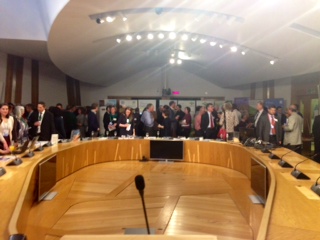UN International Year of Soils Launch at the Scottish Parliament
 16 April 2015, Edinburgh, United Kingdom – The United Nations declared 2015 to be the International Year of Soils, emphasizing the multiple roles of soils and the importance of sustaining them.
16 April 2015, Edinburgh, United Kingdom – The United Nations declared 2015 to be the International Year of Soils, emphasizing the multiple roles of soils and the importance of sustaining them.
On 31 March 2015, CIFAL Scotland in partnership with SEPA, SRUC, SNH and The James Hutton Institute hosted the Scottish launch of the UN International Year of Soils. Over 70 delegates including parliamentarians, consular representatives, scientists, and local soil associations joined the discussion which took place at the Scottish Parliament.
Co-hosted by Rob Gibson, MSP the event in Scotland marked the beginning of the International Year and provided a platform for showcasing Scotland’s active engagement with the sustainable management and protection of soil resources. Featured speeches included Aileen Mcleod, Minister for Environment, Climate Change and Land Reform and a welcome recorded message by FAO Director-General Jose Graziano da Silva.
James Curran, SEPA CEO, concluded his address with a meaningful quotation from Sanskrit scriptures, contextualising the universality of preserving soils over time and place.
"Upon this handful of soil our survival depends. Husband it and it will grow our food, our fuel, and our shelter and surround us with beauty. Abuse it and the soil will collapse and die, taking humanity with it".
CIFAL Scotland and partners in Senegal and Bangladesh are engaged in projects to restore the fine balance of soils in different contexts. In Northern Senegal, the initiative aims to reverse the desertification trend due to years of agricultural mismanagement; in Southern Bangladesh it aims to tackle the increasing intensity of soil salinity.
In the Khulna and Bagerhat region of Bangladesh over 50% of agricultural land is affected by salinity caused by tidal flooding during the wet season and upward movement of saline ground water during the dry season. With very low organic matter content in the soils, communities struggle to get the yields necessary for their food security and livelihoods.
CIFAL Scotland’s approach is to empower communities at the local level, in order for them to identify the obstacles they face and the solutions that best meet their needs. Recently, the training centre conducted a permaculture training led by Pradyut Nayek, considered the top permaculturalist in West Bengali, where community leaders from 42 villages learnt new approaches to food growing over saline soil. Raised beds and floating vegetable cultivation, together with a series of natural techniques to improve soil fertility such vermin compost and green manures were added to their repertoire of techniques to enhance their food security.
In the Podor region of Senegal the attempt to increase agricultural productivity over the last decades has led to an extension of monocultures and thus to a significant loss of agrobiodiversity and accelerated soil erosion. The food systems that communities have inherited have failed them, turning productive land into a lunar landscape.
In order to reverse growing desertification, reduce erosion, conserve rainfall runoff and improve lower groundwater recharge CIFAL Scotland is promoting utilising the traditional vetiver grass system. In the first quarter of the year communities are gathering tons of manure, increasing nutrients, covering bare soil, fencing the plots and developing their food system plans utilising agro-forestry and permaculture approaches to food growing.
In the Bangladesh and Senegal projects, respectively funded by the Scottish and UK Governments, communities are replacing the input-intensive agriculture paradigm with new food systems, focused on well-being, resilience and sustainability; while paving the way towards access to healthy, diverse and locally produced food in healthy soils.
Picture: Launch of IYS in Scottish Parliament

